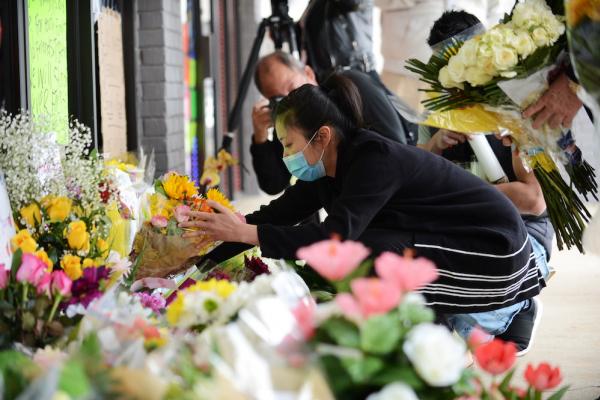In the wake of the atrocities of March 16, Asians in the U.S. are beginning to mobilize en masse against the hatred directed at our community. The Asian American Christian Collaborative has scheduled six rallies in six cities for March 28. The AACC’s statement on the Atlanta shootings has also garnered hundreds of signatories since it was posted on March 22. A GoFundMe for the two sons of one of the victims has raised $2 million. The hate-tracking website Stop AAPI Hate apparently received so much traffic that it temporarily went offline.
In awakening to the urgency of organized resistance, Asians and their allies have taken a much-needed step in the battle against racism. And yet, as we move from grief to action, we must remember that hatred, like love, is embodied. As such, I’m circulating an open letter that not only condemns hate generally, but also calls specific Christian nationalists, and their enablers, to repentance.
As Angela Denker pointed out in her article for Sojourners, this shooting follows a year in which “white conservatives ... [used] racist nicknames for COVID-19 and [blamed] AAPI people for the pandemic.” Those white conservatives, in turn, followed politicians who almost single handedly birthed COVID-19-era animosity toward Asians. A recent study published in the American Journal of Public Health confirmed that former President Donald Trump’s use of the term “Chinese Virus” likely caused a spike in anti-Asian sentiments online. However, as the Atlantic Council’s Digital Forensics Research Lab showed last year, right-wing politicians such as Rep. Paul Gosar (R-Ariz.) and Sen. John Cornyn (R-Texas) were equally instrumental in fomenting hostility toward Asians. DFRLab director Graham Brookie puts it starkly: “The thing we can prove pretty consistently is that [politicians] are the main amplifiers ... That is what drives stigmatization.”
These sentiments, as the AJPH study’s co-author Dr. John Brownstein warned, “don’t stay online.” Verbal harassment has accompanied 68 percent of incidents reported to Stop AAPI Hate over the past year. Yet even as some politicians stoke violence, they brand themselves as Christian soldiers: Gosar, Cornyn, and Sen. Marsha Blackburn (R-Tenn.) make their faith central to their public identity. This marketing ploy derives from the allure of Christian nationalism, a reactionary worldview to which almost half of surveyed Americans espouse some degree of attachment. Linking religious fervor with hostility toward “foreigners” and patriarchal attitudes about women’s “proper place,” Christian nationalists unsurprisingly tend to find nothing racist about the term “Chinese virus.” They certainly find nothing racist about fulminating against “godless China” on Twitter.
In the face of this frighteningly successful attempt to recast the gospel as a message of hatred, these politicians’ churches respond with either silence or vocal support. The consequences can be seen in the horrors of Atlanta. The shooter, an active member of Crabapple First Baptist, a Southern Baptist-affiliated church, sat in a denomination whose ranks include Sen. Ted Cruz (R-Texas), Sen. Lindsey Graham (R-S.C.), and Rep. Kevin McCarthy (R-Calif.). All of these politicians have made racist comments or advocated for xenophobic legislation. With such politicians enjoying the affirmation of their own influential churches, is it any wonder that Crabapple’s pastor Brett Cottrell could not “recall any sermons dealing specifically with racism,” even as Crabapple’s Asian American congregants have witnessed a spike in hostility toward their ethnicity over the last year?
Reading the gospel of Luke after the Atlanta shooting, I was struck by Jesus’ own response to “well-resourced” religious bigots. In the Sermon on the Mount, Christ offers the classic injunction to which anxious white people have looked whenever a racist goes on a killing spree: “Love your enemies, do good to those who hate you … If anyone strikes you on the cheek, offer the other also” (Luke 6:27, 29). However, this famous call for nonviolence immediately follows Jesus’ less-than-irenic warning, “Woe to you who are rich, for you have received your consolation. Woe to you who are full now, for you will be hungry” (Luke 6:24-25). These woes, in turn, echo the Magnificat of Luke 1:46-55, where Mary declares, “He has filled the hungry with good things, and sent the rich away hungry” (verse 53). Immediately after this declaration, Luke highlights the richest man in Rome, Augustus Caesar, who sends his subjects on a pilgrimage to satisfy his hunger for glory (Luke 2:1).
The Christ of Luke, then, does not simply offer the other cheek as an abstract expression of peace. To the contrary, he does so as part of a ministry predicated on loving but unwavering confrontation with the Roman supremacists of his day, as well as their religious accomplices. Such enablers are seen responding to Jesus’ public announcement of ministry in Luke 4, when they threaten to throw Christ off a cliff for heralding the faith of Naaman the Syrian and the Phoenecian widow Elijah visited in Sidon (verses 26-27). In coupling these references with a declaration of “liberty for the oppressed,” Christ exposes the hollowness of a faith that disdains the idea of interracial solidarity among the exploited and dispossessed. That faith, like the Christianity of the “Southern Aristocracy,” divided the masses to the benefit of the colonial masters. In this context, we must recall theologian Walter Wink’s argument that “turning the other cheek” constitutes a nonviolent form of resistance to oppressive abusers, a dare for them to use the hand with which such abusers would only strike an equal.
It’s in the spirit of Luke’s gospel, then, that I invite readers to join the array of theologians, pastors, and laity who comprise my open letter’s 600+ signatories. Encompassing Asian American Christians, Asians of other creeds, and allies of any background, the letter insists on solidarity against the emperors who create division and the religious establishment that consents to it. It calls for public repentance not only from particular politicians, but also from particular church leaders who have passively affirmed “sanctified Sinophobia.” To salvage both our faith and the possibility of an interracial democracy, we in the church must confront the people who have imperiled both. Turning the other cheek in the face of “China Virus” means defiantly showing all of our humanity, and demanding that the haters standing before us act accordingly.
Got something to say about what you're reading? We value your feedback!







